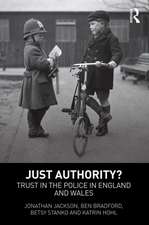Police: Streetcorner Politicians
Autor William K. Muir, Jr.en Limba Engleză Paperback – 15 iun 1979
"This book . . . examines the problem of police corruption . . . in such a way that the stereotype of the crude, greedy cop who is basically a grown-up delinquent, if not an out-and-out robber, yields to portraits of particular men, often of earnest good will and even more than ordinary compassion, contending with an enormously demanding and challenging job."—Robert Coles, New Yorker
"Other social scientists have observed policemen on patrol, or have interviewed them systematically. Professor Muir has brought the two together, and, because of the philosophical depth he brings to his commentaries, he has lifted the sociology of the police on to a new level. He has both observed the men and talked with them at length about their personal lives, their conceptions of society and of the place of criminals within it. His ambition is to define the good policeman and to explain his development, but his achievement is to illuminate the philosophical and occupational maturation of patrol officers in 'Laconia' (a pseudonym) . . . . His discussions of [the policemen's] moral development are threaded through with analytically suggestive formulations that bespeak a wisdom very rarely encountered in reports of sociological research."—Michael Banton, Times Literary Supplement
"Other social scientists have observed policemen on patrol, or have interviewed them systematically. Professor Muir has brought the two together, and, because of the philosophical depth he brings to his commentaries, he has lifted the sociology of the police on to a new level. He has both observed the men and talked with them at length about their personal lives, their conceptions of society and of the place of criminals within it. His ambition is to define the good policeman and to explain his development, but his achievement is to illuminate the philosophical and occupational maturation of patrol officers in 'Laconia' (a pseudonym) . . . . His discussions of [the policemen's] moral development are threaded through with analytically suggestive formulations that bespeak a wisdom very rarely encountered in reports of sociological research."—Michael Banton, Times Literary Supplement
Preț: 289.96 lei
Nou
Puncte Express: 435
Preț estimativ în valută:
55.49€ • 57.72$ • 45.81£
55.49€ • 57.72$ • 45.81£
Carte tipărită la comandă
Livrare economică 14-28 aprilie
Preluare comenzi: 021 569.72.76
Specificații
ISBN-13: 9780226546339
ISBN-10: 0226546330
Pagini: 313
Dimensiuni: 152 x 229 x 25 mm
Greutate: 0.4 kg
Ediția:Revised
Editura: University of Chicago Press
Colecția University of Chicago Press
ISBN-10: 0226546330
Pagini: 313
Dimensiuni: 152 x 229 x 25 mm
Greutate: 0.4 kg
Ediția:Revised
Editura: University of Chicago Press
Colecția University of Chicago Press
Notă biografică
William Ker Muir, Jr., is professor emeritus of political science at the University of California at Berkeley. He is also the author of Legislature: California's School for Politics, and Prayer in the Public Schools: Law and Attitude Change, both published by the University of Chicago Press.
Cuprins
Acknowledgments
1. The Problem of Coercive Power
1. "What is a Good Policeman?"
2. Four Policemen
3. The Extortionate Transaction
4. The Professional Political Model of the Good Policeman
2. The Four Paradoxes of Coercive Behavior
5. The Paradox of Dispossession: Skid Row at Night
6. The Paradox of Detachment: The Family Beef
7. The Paradox of Face: The Crowd Scene
8. The Paradox of Irrationality: The Juvenile Caper
9. The Responses to the Four Paradoxes of Coercive Power
3. The Development of Policemen
10. The Development of Understanding
11. The Development of Morality
12. Causing Professionalism
4. Implications
13. The Chief's Choices
14. Does Coercive Power Tend to Corrupt?
Methodological Note
Bibliographical Essay
Index
1. The Problem of Coercive Power
1. "What is a Good Policeman?"
2. Four Policemen
3. The Extortionate Transaction
4. The Professional Political Model of the Good Policeman
2. The Four Paradoxes of Coercive Behavior
5. The Paradox of Dispossession: Skid Row at Night
6. The Paradox of Detachment: The Family Beef
7. The Paradox of Face: The Crowd Scene
8. The Paradox of Irrationality: The Juvenile Caper
9. The Responses to the Four Paradoxes of Coercive Power
3. The Development of Policemen
10. The Development of Understanding
11. The Development of Morality
12. Causing Professionalism
4. Implications
13. The Chief's Choices
14. Does Coercive Power Tend to Corrupt?
Methodological Note
Bibliographical Essay
Index













